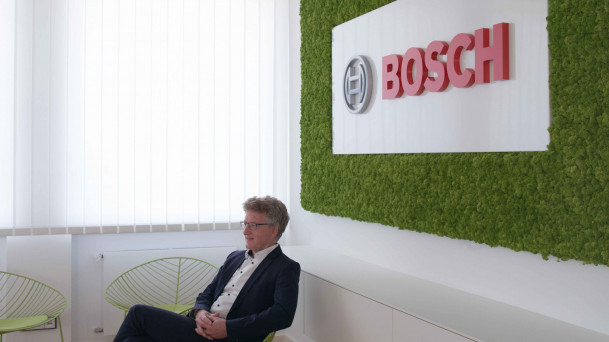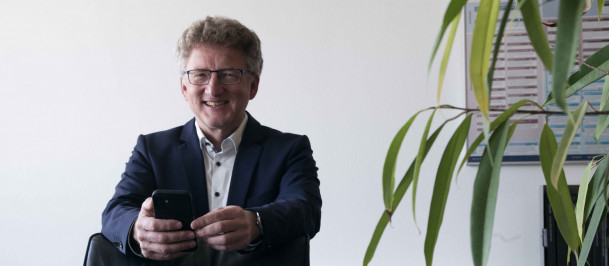Standortfragen
In this interview, the new site director of Bosch Home Comfort Group in Wetzlar, Dr. Rainer Ortmann, reflects on current challenges, plans for the future and his ties to the region.
His professional career at Robert Bosch GmbH took Dr. Rainer Ortmann from Stuttgart to India and finally to Wetzlar. He has been working for Bosch Home Comfort Group since 2006 and is currently vice president of governmental affairs with focus on energy politics. Although he is traveling a lot, Wetzlar is where he truly feels at home.
W3+: Mr Ortmann, you have served as the new site director of Bosch Home Comfort Group in Wetzlar since January 1st, 2023. How were you received?
Rainer Ortmann: I settled down here seventeen years ago and have close ties to the region. That is why I’m all the more delighted that I was actually received very cordially and accepted outright as the new site director in Wetzlar.
W3+: How did you experience the first six months?
Rainer Ortmann: Due to my job as vice president of governmental affairs, I am very often in Berlin. As site director here in Wetzlar, I’m faced with rather tangible challenges. It’s a well-known fact that the situation was not easy at the turn of the year when I started out. We were still dealing with the aftermath of the pandemic. Although the dramatic development of the energy prices has settled down again, prices are still on a high level. Our site here in Wetzlar occupies a floor area of 17,000 square meters. We had to find solutions to make sure everything is running smoothly in the offices and behind the scenes.
W3+: So, you were thrown in at the deep end, and even more in a challenging winter.
Rainer Ortmann: Shouldering more responsibility didn’t catch me off guard. And, fortunately, making the right decisions in such a situation does not rest on the shoulders of the site director alone. I very quickly realized that I have got a splendid team here which I can rely on completely. Especially the Facility Management staff, who are in charge of building operation management, building security, maintenance and subsequent development, have done a really great job in the past months.
W3+: At any rate, those six months were turbulent. Again and again, there has been talk about a “historical turning point” in energy politics. What is your assessment of the situation?
Rainer Ortmann: If you take a look at the discussions about energy politics over the past months and how they were held in public, things have certainly been turbulent. For me, the term “turbulent” has a rather positive connotation, though. My whole professional career has always been about coping with tasks and finding solutions. It helps immensely if you regard matters from different perspectives. That’s the only way to meet the complexity of an issue. The “turning point” in energy politics that you mentioned actually encompasses several sectors in which changes are required: industrial, public and private energy supply, security of supply in urban and rural areas, energy-efficient heating technology or sustainable mobility concepts, to mention only the most significant ones. Every single one of these matters is complex enough in itself. If you consider them all together under one focal point, it quickly becomes clear that it is just not possible to find simple solutions.
W3+: What are the biggest challenges in your opinion?
Rainer Ortmann: I think everybody knows more or less what is heading our way. The EU has committed itself on a large scale to become climate-neutral until 2050. This is an ambitious goal. But it is also up to us to make sure with discernment and foresight that people won’t get overwhelmed by these challenges. That’s exactly what we try to convey to our customers as a full-service provider for heating, cooling, and home comfort.

»Future needs provenance. This is quite obvious in a corporation steeped in tradition such as Bosch. The significance of the Wetzlar site within the Bosch Home Comfort Group has, of course, also to do with the long history of Buderus here in the region.«
W3+: As the biggest supplier of heating installations in Europe, you are currently dependent on decision made in energy politics. Is it even possible to operate in a target-oriented manner under such circumstances? To what extent are you forced to react quickly?
Rainer Ortmann: We are a proactive company. Being experts in heating technology, we are also appreciated as specialist references in politics. As far as I’m concerned, I was actively involved in the revision of the German Buildings Energy Act which is amended regularly every three years. Such involvement is permitted and desired in the German legislative procedure. That Act doesn’t contain any surprises for which we are not prepared in technological respects. Of course, we are expected to meet the requirements of the market quickly and agilely. What will matter then, however, will not be the type of heating technology but the question how to implement heating technology solutions expertly and in a way that is affordable for the customers.
W3+: Customers are still insecure. Especially since scarcely anybody is able to gage which technologies will prevail in the long run. Bosch Home Comfort Group relies on several solutions. Is this the right way?
Rainer Ortmann: The development in heating technology has always been open to all types of technologies. Under the umbrella of the Bosch Home Comfort Group, we cover the whole range now: from different heat pumps and heat pump hybrid systems to condensing boilers, air conditioning and solar thermal systems as well as efficient energy management. We follow the specific requirements of our customers first of all. That’s crucial since the requirements of a medium-sized manufacturing company with regard to energy technology differ considerably from those of the private home of a single family in a detached house. What is more, the particular supply infrastructure has to be considered in each individual case. This is exactly what is to be determined within the scope of municipal heat planning.
W3+: The name Buderus has been closely linked with the region for more than 150 years. How much can you bank on provenance when it comes to the future?
Rainer Ortmann: Future needs provenance. This is quite obvious in a corporation steeped in tradition such as Bosch. The significance of the Wetzlar site within the Bosch Home Comfort Group has, of course, also to do with the long history of Buderus here in the region. In 2003, the heating technology activities of Buderus and Bosch Thermotechnik as it was called then were merged. I was directly involved in the integration almost from the beginning. And I can say: Wetzlar is still an enormously significant location. It is the “home port” of our leading brand Buderus. What is more, as the site director of Wetzlar, I am in close contact with the colleagues in Lollar and Eschenburg-Eibelshausen. That is where we are currently conducting an ultra-modern heat pump production.
W3+: Your company can claim longstanding experience and expert knowledge. How do you intend to safeguard this technological competence in terms of qualified young talents for the future?
Rainer Ortmann: We invest a lot into the training and qualification of our employees. That is because some completely new skill sets and proficiencies are required as part of the continuous technological development. This concerns the productive sector in the same measure as our IT or sales departments. In addition to that, we collaborate very closely with the University of Applied Sciences THM and StudiumPlus. Needless to say, we are pleased that we rank among the most attractive employers in the region. But we also do a lot on that account.
W3+: Bosch Home Comfort Group is one of the most important employers in the region. Will this still be the case in the future?
Rainer Ortmann: Yes.
Additional Information:
